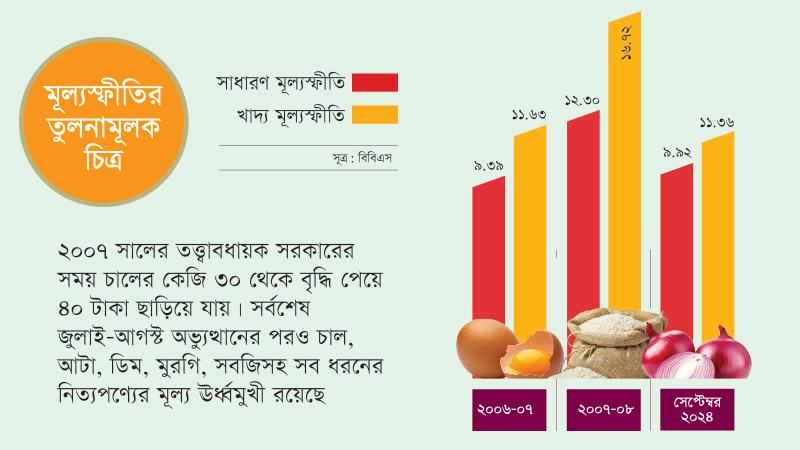The much-discussed One-Eleven caretaker government took office in January 2007. Anti-corruption campaign was strengthened across the country after assuming office. Many big businessmen covered their heads to avoid raids. Product supply is disrupted. Two floods and Cyclone Sidor occurred in the country that year. The agricultural sector is affected. Due to these effects, the market situation became unstable. The situation could not be resolved even with the initiative of importing food. Inflation exceeds 12 percent. And food inflation rose to about 17 percent. At that time public anger started to increase due to such a rise in the prices of daily commodities. At one point, the caretaker government of one-eleven led by Fakhruddin Ahmed was forced to withdraw through elections.
After a decade and a half, the situation of that time is being repeated in the market of everyday products. After the fall of the Awami League government in August, Professor Dr. took charge of the country. Interim government led by Yunus. Within 12 days of this government assuming power, a terrible flood occurred in 11 districts of the central-eastern part of the country. In this alone, the loss in the agriculture sector is at least 5 thousand crores, which is about 36 percent of the total loss. Sherpur, Netrakona, Mymensingh and Jamalpur were flooded again at the beginning of this month without overcoming the effects of this flood. According to preliminary estimates, the flood has caused a loss of around Tk 1,100 crore in the agricultural sector alone.
At present, the price instability in the country’s commodity market has become stronger. The price of coarse rice has risen above Tk 60 per kg. The vegetable market has also become hot. Almost all types of vegetables cost around 100 rupees per kg. Instability has also appeared in flour, egg and chicken markets. The price of hilsa has increased. According to the government, the egg market is out of control even though the production is more than the demand.
The issue of market management and syndicate violence is now being discussed after the supply crisis behind the increase in the prices of daily commodities. The government has taken various initiatives including duty exemption on some products to control the market. But even after that, the market is not getting relief. Bringing the price situation back to normal in the commodities market has become a challenge for the new government. Many market observers see the current situation in the commodity market as a repeat of the 1-11 caretaker government.
A former research director of Bangladesh Institute of Development Research (BIDS) believes that not only the supply shortage of products, but also uncertainty makes the market unstable. “Suppliers behave differently when there is uncertainty in the market,” he told Merchant News on condition of anonymity. Then there is an expectation of price increase. Due to the impact of floods, the production may be less in the future, the price of rice is increasing. Moreover, people now have a lot of money outside the banks. It has the same effect as printing extra money. If so much money is in the hands of people, it can contribute to market instability.
There were two successive floods in August and September 2007. Sidor strikes in November. It caused a lot of damage to the Amon in the field. About 10 lakh hectares of cropland was damaged. According to the reports published in the media at that time, the average price of rice in the beginning of 2007 was Tk 33 per kg, but in 2008, it rose to Tk 45. However, in 2009 it came down slightly to Tk 40 per kg. However, agricultural economists are of the opinion that the price should not increase as the production is high this time and there is sufficient stock. Agricultural economist Dr. Jahangir Alam Banik told Barta, “More than four million tons of rice have been produced in the country this time. As a result there is no shortage of rice. There is also enough stock at the government and private levels. So the price should not increase. But suppliers are raising prices. A campaign against these manipulations is necessary. Even though the government has changed, there has been no change in market management.’
Many individual entrepreneurs are now in the list of major suppliers in the country’s commodity market. These individuals and many businesses have faced various restrictions for being involved in various irregularities of the previous government. As a result, their business activities are also coming to a standstill.
Economist and East West University professor of economics in this regard. AK Enamul Haque told Merchant Barta, ‘The easiest way to break the syndicate is to allow imports when there is a shortage of products. But if you catch them, there will be instability. During the last caretaker period, many people closed their businesses when the raids started. If this still happens, more instability will be created in the market.’
During the eleventh government, floods and cyclones and market mismanagement caused inflation to rise as commodity prices rose. In the fiscal year 2006-07, general inflation was 9.39 percent, but in the next fiscal year, it increased to 12.30 percent. The general inflation of the country was 9.92 percent last month as well. And food price inflation is above 11 percent.
Interim government policymakers have identified syndicates as a major cause of market instability. Even yesterday, the main reason for the increase in the price of eggs, citing the ‘syndicate’, Fisheries and Livestock Adviser Farida Akhtar said that the government is working on it. Regular raids are going on in the market. In the meantime, wholesale prices are falling slightly. The price will come soon.
Economists believe that no effective results have been obtained from the government’s monitoring system. If there is a syndicate in the market, the nation will not be freed from the artificial crisis, said the former professor of economics department of Chittagong University. Mainul Islam. He told Vanik Barta, ‘Government’s market monitoring system is not working well. I did not see any attempt to break the syndicate. And it does not seem that relief will return to the market before winter.’
The government has already set up district-to-district coordinated committees headed by DCs to control the markets. Initiatives have also been taken to exempt some daily products. Import is also allowed. But the impact of these is hardly falling on the market. In the meantime, due to the increasing conflict in the Middle East, the price of fuel oil is increasing in the international market. Market observers fear that its impact may fall on the country’s market in the future.
Consumers Association of Bangladesh (CAB) Vice President SM Najer Hossain feels that the new government has not yet taken any effective initiative in market reform. He said, ‘market monitoring is going on at a low level. But that should have been the main priority. Like other reform programs and commissions, the government should have had a specific position on commodity market reforms. Even if the minister changes, the bureaucracy remains the same. They have maintained syndicates in the market through cycles with traders.’
When asked about the government’s activities to control the prices of daily commodities including rice and flour, the new secretary of the Ministry of Food said. Masudul Hasan Banik told Barta, ‘Rice and flour are being sold at affordable prices to 1 crore families through TCB and 50 thousand families through OMS. OMS dealers are being appointed in the light of the new policy in the district. Many of the earlier politically appointed dealers have fled. So by appointing new dealers, we are ensuring the people get rice and flour.’





